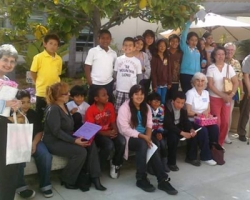Many of us have a story waiting to be told. How that story is interpreted by others can be delightful and insightful, as I learned when joining several volunteers from Culver City Senior Center to have our biographies prepared by children from Inglewood’s Worthington Elementary School for a living history project under the guidance of LEAP (Learning Enrichment After-School Program), a collaboration made possible by the Culver City Parks, Recreation and Community Services Department.
LEAP’s creation in 2004 was triggered by frustration over the lack of available after-school programs designed to make a measurable improvement in children’s lives instead of simply providing day care. Two educators designed and implemented its first program, which served 20 children at a South Los Angeles school. With a current staff of more than 50 professionals, the nonprofit organization now operates at 10 underserved schools in Los Angeles and surrounding communities, serving more than 900 culturally diverse, at-risk elementary and middle school students. In 2009, its ability to produce results and improve lives was acknowledged by a commendation from the Los Angeles City Council.
From the close of every school day until 6 p.m., and at no cost to parents, LEAP offers a nutritious snack, homework assistance, tutoring and enrichment classes. It uses that window of after-school time to carry out its mission “to develop well-rounded individuals by motivating students to excel academically, encouraging them to dream and teaching them to be healthy, productive citizens.”
The living history project occupied two afternoon meetings at the senior center. The first took place on June 9, when the children were matched up with senior volunteers, whom they interviewed in order to obtain material for the biographies.
During that initial meeting, the seniors were regaled with questions that included childhood and school memories, family background, job history, favorite foods, sports, hobbies and personal philosophies. I had the great pleasure of being interviewed by Grecia, age 10, and Aristhani, age 8. After I described my childhood passion to be an artist and the paths I created to reach that goal, Grecia observed that “your soul has gone out to find its way.”
Reclaiming the role of interviewer, I asked them about the most important thing that they want to achieve in their lives. Aristhani instantly and emphatically replied, “Family!” Grecia said, “I want to have a family, yes, but I want to know who I am first. That way I can be more help to my husband and my children.”
After the interviews were concluded, Jill Thomsen, the center’s volunteer specialist, gave the children a tour, ending in a room where dance lessons were being given. The instructor offered to teach them some basic Cha-Cha steps, a bonus activity in which they engaged with alacrity.
At the second meeting on June 15, the children presented each senior with the books they had prepared – biographies, illustrated with colorful, whimsical drawings – but also with charming, hand-decorated keepsake boxes containing mementos. As they handed me the pink cloth-covered box festooned with decorations that they had so carefully attached, Grecia and Aristhani cautioned me, “Don’t forget us.”
The children took turns standing before the entire group to read each biography. Buoyed by the applause and broad smiles that followed their presentation, they were then escorted to the exercise room for a brief but entertaining talk about the benefits of physical activity. Afterwards, in what could have been the highlight of their visit, their final stop was a room where karaoke was in session. When invited to the stage, several jumped at the opportunity to sing and participated with untrammeled gusto.
Lateshia Cannon, LEAP’s program administrator, explained “our theme for this year is ‘Pride, Engagement and Enthusiasm.’ Pride – you care; engagement – you’re present; and enthusiasm – you’re excited.” It was apparent that the children had taken that theme to heart.
After the first meeting, Cannon told me that she feels “the living history project was a success and the kids can’t wait to return with their finished biographies.” She added, “It will help our students develop sensitivity to the needs and contributions of seniors. It is also an enriching experience for the seniors.”
No argument there, as I confirmed following the conclusion of this project when I quizzed senior volunteers Lionel Crown and Norma Glickman about their impressions.
“The children got to see that we are active; not sitting at home in a rocking chair,” Crown said with a grin. “They were extraordinarily well-behaved, courteous and respectful.”
Glickman added, “There was one boy who was having trouble reading out loud. Another boy was helping him as unobtrusively as possible and that moved me deeply. I love working with young people. It is renewing and gives me hope for the future.”
Ryan Taylor, LEAP’s executive director, informed me that the living history project was broad in scope, encompassing various senior venues in addition to the Culver City Senior Center. He cited a recent visit to Westchester Villa Assisted Living Community, during which students from Hudnall Elementary School in Inglewood bonded with retired educators, a Hurricane Katrina survivor and army veterans. He said the seniors were “overjoyed with having quality time with youth, and the students loved sharing their life, talents and future dreams with their new friends.”
Curiosity and creativity are assets inherent in children regardless of demographics; assets that LEAP is clearly committed to cultivating. Its motto is “learning doesn’t stop when the school day ends,” and programs such as this provide a valuable edge by giving children exposure to a variety of environments and the opportunity to learn how to successfully navigate within them.
Information about LEAP is available at leapusa.org.

